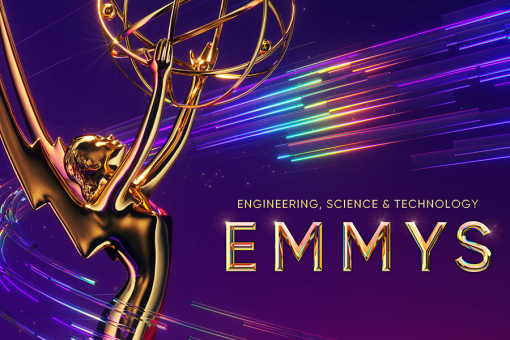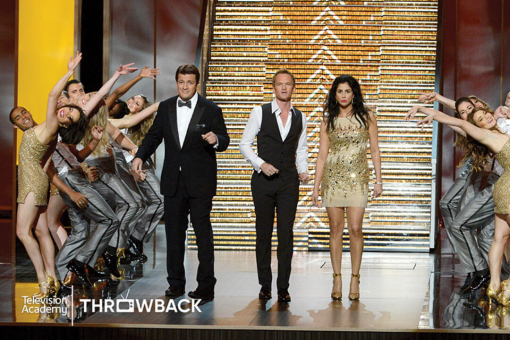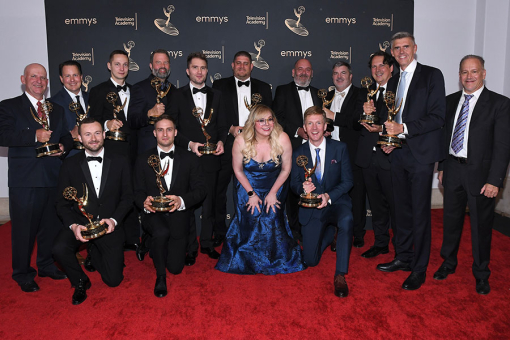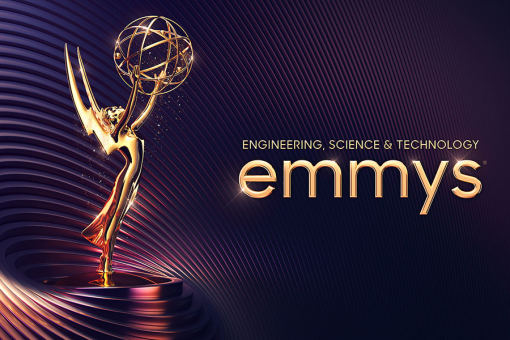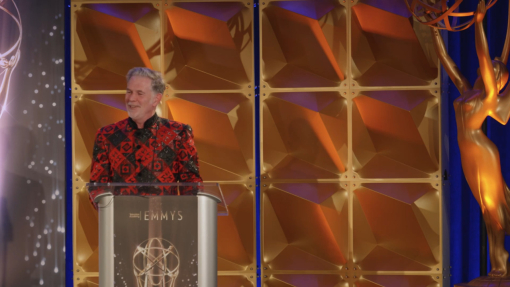"I'd like to thank the Academy" is heard at any Television Academy awards ceremony. That certainly held true for the 2013 Engineering Awards, the final event of the 65th Primetime Emmy Awards season. But there was another thank-you theme as well. Throughout the evening, recipients repeatedly thanked the television industry itself, for using the various technologies being recognized.
Nine honors were presented during the ceremony, held October 23 at Loews Hollywood Hotel to coincide with the annual Technology Conference & Exhibition of the Society of Motion Picture and Television Engineers (SMPTE) and hosted by actress Sarah Shahi of CBS's Person of Interest.
In her opening remarks, Wendy Aylsworth, chair of the Academy's Engineering Awards committee, took the evening to a higher-than-usual orbit — with a commemoration of the fiftieth anniversary year of NASA's launch of the Syncom 2 communications satellite.
That milestone "presaged the technologies that first enabled reliable international television connectivity," noted Aylsworth, who is senior vice-president of technology at Warner Bros. Technical Operations and also SMPTE president. "[It] now continues to define modern global culture." Harold Rosen, the principal designer and chief engineer of Syncom 2, was unable to attend; NASA historian Bill Barry was applauded from the audience.
Back on earth, Sennheiser Electronic Corporation received one of the evening's two highest honors, the Philo T. Farnsworth Award, named for the inventor of many of the technologies that led to the development of television and given to a company whose contributions over time have significantly influenced television technology and engineering.
Founded in Germany in 1945 by the late Fritz Sennheiser and seven other engineers, the company is particularly noted for its microphones — it previously received an Emmy as well as an Academy Award — and also manufactures high-quality audio products such as headphones, amplifiers and speakers.
Accepting were the company's CEOs, Dr. Andreas Sennheiser and Daniel Sennheiser, grandsons of the founder. "It is a great honor to receive this prestigious award," Daniel said. "From the very beginning [the founders] were driven by a desire to capture sound as perfectly as possible."
Lauding the collaboration of their customers around the globe, he added, "You, the broadcast industry... push us constantly to push beyond our current borders, to bring you the best audio solutions for your shows. We do this based on two fundamental factors: superior audio performance and reliability. It's our job to provide you with the most advanced and reliable audio systems in the world. Thank you for your trust."
Brother Andreas drew a laugh when he thanked Sennheiser's 2,500 passionate employees, "most of whom suffer physically if they attend a performance with poor audio." As a family-run company, he said, "We can focus our energy on making better products, being close to our customers, striving to give you the best service in the world. This is our mission. It was in the past, it is today and it will be in the future."
In an unusual twist, the Charles F. Jenkins Lifetime Achievement Award, which honors an individual whose ongoing contributions have significantly affected television technology and engineering, was presented to a member of the Engineering Awards committee, Christopher J. Cookson.
Aylsworth explained that she and the other committee members decided in a secret meeting that Cookson — now president of Sony Pictures Technologies, following positions at RCA, ABC, CBS and Warner Bros. — exemplified the attributes necessary to be considered for the award. A recipient of two Emmys, he has pioneered work in moving processes from analog to digital; patented methods of carrying high-quality data on optical media; developed innovative film archive restoration methods and created the foundation for digital workflows with automated distribution.
"I'd like to thank the Academy," Cookson said after taking the podium to a standing ovation. "You never think that as an engineer, you're ever going to do that." Being selected for the award by his accomplished colleagues is particularly meaningful, he said. "I have a tremendous regard for the people on the committee."
Perhaps this should be a "lifetime opportunities" award, Cookson reflected. "In this industry, we get the chance to see things and experience things a lot of people don't. When I first started working for RCA, they sent me to Africa for a month. So I was working with broadcasters in Africa. That's something I never would have imagined. I stood next to [test pilot] Chuck Yeager in a lakebed. I worked the Olympics. I stood on the floor at political conventions. I've been on the field at the World Series." More recently his realm has encompassed work in DVDs, digital cinema and digital cameras: "It's amazing, there's so much more left to do."
Five Engineering Emmys were awarded at the gala. Veteran actress June Lockhart — proudly wearing the NASA Exceptional Public Achievement Medal that she received earlier in the month — was on hand not only to celebrate the agency's satellite-launch anniversary, but to present the first statuette of the evening. That honor went to YouTube, for the technology that has created innovative ways to upload, store, manage and deliver video programming to viewers.
"I first appeared on television in its broadcast infancy," said Lockhart, whose classic series include Lassie and Lost in Space, "and tonight I am presenting an award to a technology that's in its internet infancy." Accepting on behalf of YouTube were networking director Steve Walter and engineering director Jason Gaedtke.
Engineering Emmys were also awarded to:
Aspera Inc., for FASP transport technology, a high-speed data transfer software; accepting were technology president and co-founder Michelle Munson and vice-president of engineering and co-founder Serban Simu.
Digital Dailies inventor Josh C. Kline, for his web-based streaming distribution system for production dailies and cuts.
iZotope, for its RX audio-repair technology to repair and restore audio from unwanted noises, reverb and other problems; CEO Marc Ethier accepted.
Lightcraft Technology, for its Previzion Virtual Studio System, technology that allows shooting a virtual set as freely as a physical set; Philip Mass, co-founder and CTO, and Eliot Mack, co-founder and CEO, accepted.
Two Engineering Plaques were awarded to:
Lawo, for its audio networking and routing system for large-scale television entertainment productions; CEO Phillip Lawo accepted with Herbert Lemcke, president LAWO North America, and Felix Krueckels, senior product manager.
Final Draft, Inc., for its industry-standard Final Draft screenwriting software; CEO and founder Marc Madnick accepted.
The ceremony included screenings of video segments for each of the honorees. Watch all seven videos here.



